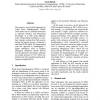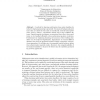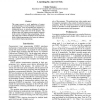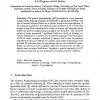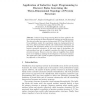112
click to vote
ACL
2006
15 years 3 months ago
2006
We present a novel hybrid approach for Word Sense Disambiguation (WSD) which makes use of a relational formalism to represent instances and background knowledge. It is built using...
116
click to vote
AAAI
2006
15 years 3 months ago
2006
A novel and simple combination of inductive logic programming with kernel methods is presented. The kFOIL algorithm integrates the well-known inductive logic programming system FO...
107
click to vote
OWLED
2007
15 years 3 months ago
2007
The use of background knowledge and the adoption of Horn clausal logic as a knowledge representation and reasoning framework are the distinguishing features of Inductive Logic Prog...
110
click to vote
PKDD
2000
Springer
15 years 5 months ago
2000
Springer
Although there is a growing need for multi-relational data mining solutions in KDD, the use of obvious candidates from the field of Inductive Logic Programming (ILP) has been limit...
118
click to vote
ILP
2000
Springer
15 years 5 months ago
2000
Springer
A method for learning multivariate time series classifiers by inductive logic programming is presented. Two types of background predicate that are suited for this task are introduc...
137
click to vote
ASP
2001
Springer
15 years 5 months ago
2001
Springer
This paper presents a novel application of answer set programming to concept learning in nonmonotonic logic programs. Given an extended logic program as a background theory, we in...
131
click to vote
EVOW
1994
Springer
15 years 6 months ago
1994
Springer
The genetic programming (GP) paradigm is a new approach to inductively forming programs that describe a particular problem. The use of natural selection based on a fitness ]unction...
111
click to vote
ILP
1998
Springer
15 years 6 months ago
1998
Springer
Abstract. Inductive Logic Programming (ILP) has been applied to discover rules governing the three-dimensional topology of protein structure. The data-set unifies two sources of in...
105
click to vote
IUI
1999
ACM
15 years 6 months ago
1999
ACM
Although Programming by Demonstration (PBD) has the potential to improve the productivity of unsophisticated users, previous PBD systems have used brittle, heuristic, domain-speci...
100
click to vote
ECAI
2000
Springer
15 years 6 months ago
2000
Springer
A number of Inductive Logic Programming (ILP) systems have addressed the problem of learning First Order Logic (FOL) discriminant definitions by first reformulating the FOL lear...
